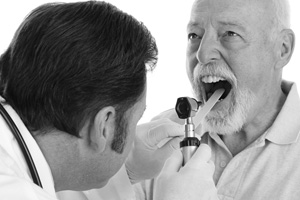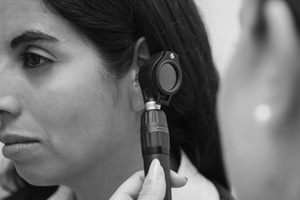View the complete list of conditions
Diagnosing Types of Vocal Disorders
Vocal disorders can vary in terms of the actual disorder, symptoms present, and options for treatment. A Central Park West ENT specialist will evaluate you if your hoarseness is present longer than 2-3 weeks or you feel pain that isn't associated with a previous cold or flu. Coughing up blood, having difficulty swallowing, or a lump present in your neck may also be indicative of an additional issue. Finally, a total loss or severe change in your voice that lasts longer than a day or two may be symptomatic of one of a few types of vocal disorders, namely hoarseness.
Hoarseness is one of the most common types of vocal disorders treated by ENT specialists in Midtown. First, the doctor will get a thorough history of your overall health and your specific condition. Then a specialist will usually examine the vocal folds to determine if something is wrong with them. It's important to figure out the cause of hoarseness because treating vocal disorders relies on the cause. In some cases, polyps or lesions are present on the vocal folds and those should be removed through surgical procedures. Other causes can include: trauma to the larynx or vocal cords, neurological conditions, or certain types of cancer.
How to treat vocal disorders
As mentioned, the types of vocal disorders you're diagnosed with and the cause of their presence weigh heavily when it comes to determining the best method of treatment. A Central Park West ENT specialist will hold off on advising a treatment plan until a definitive diagnosis has been made. Typically vocal rest and avoidance of other irritants like smoking, alcohol, or certain foods are three methods of treating vocal disorders advised by ENT specialists in Midtown. Medications for allergies or gastroesophageal reflux may also help.
Vocal therapy is also an option of how to treat vocal disorders. Speech and language pathology specialists are trained to help patients figure out how to develop better habits in terms of their speech. These pathologists can actually teach patients how to modify speech habits, which will have a positive impact on some different types of vocal disorders.
Patients often let severe hoarseness go undiagnosed because it's considered to be a simple fact of life: sometimes you just lose your voice. However, it can be indicative of a bigger issue in regards to your health. Consult with a Central Park West ENT specialist if you think your hoarseness or change in vocal sound, pitch, or volume is an issue.
Conditions
Ears
Nose
- Ballon Sinusplasty Surgery
- Concha
- Deviated Septum Relief In NYC
- Deviated Septums
- Fixing a Deviated Septum
- Identifying A Deviated Septum
- How Do I Know if My Nose is Broken?
- Nasal Polyps
- Nasal Polyp Surgery
- Nasal Septums
- NYC Nasal Polyp Reduction
- Septoplasty And Turbinate Surgery
- Treating a Deviated Septum
- Treating Nasal Polyps
- Turbinate Reduction
Throat
- Dysphagia
- Leukoplakia Treatments
- Reflux Laryngitis
- Swallowing Disorders
- Treating Anosmia
- Vocal Disorders
Allergies & Asthma
- Dealing With Allergic Rhinitis
- Managing Allergies and Asthma
- How to Allergy-Proof Your Home from Indoor Allergens
Sinus
- Chronic Sinusitis Treatment
- Endoscopic Sinus Surgeries
- Sinus Headache Cure
- Sinus Infection Treatment
- Sinusitis Surgery
- Treating Sinus Infections
Sleep & Snoring
- Diagnosing Sleep Disorders
- Having Trouble Sleeping
- Home Sleep Studies
- Pillar Implants
- Pillar Treatment for Snoring
- Sleep Apnea Conditions
- Sleep Apnea Specialists
- Sleepless in NYC
- Sleep Study Diagnosis
- Can Snoring Cause Health Issues?
- Treating Sleep Apnea
- Treating Snoring
- What is a CPAP Device?





